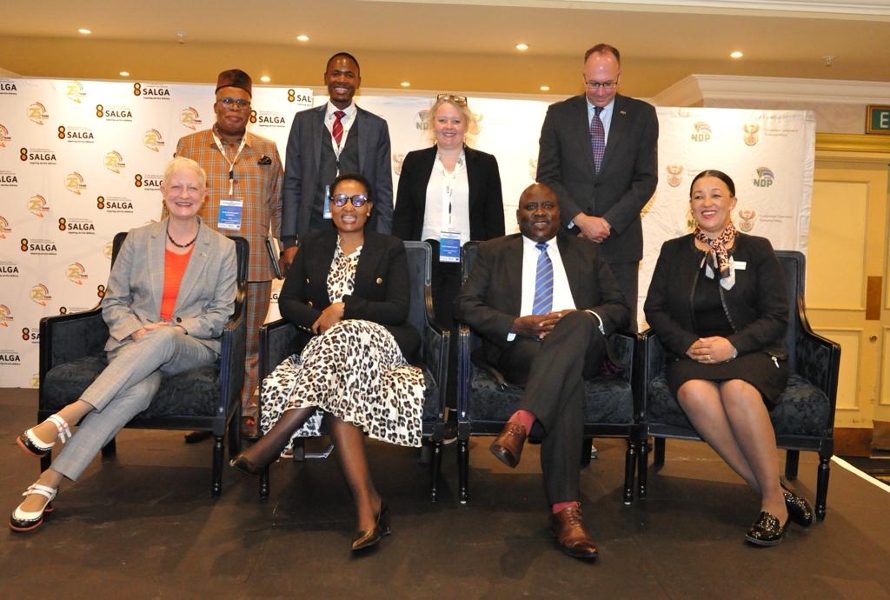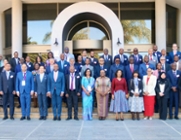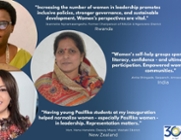CLGF Southern Africa Regional Conference

04 May 2022
CLGF’s Southern Africa Regional Conference kicked off on Wednesday with a focus on local economic development, post COVID-19 recovery, and regional cooperation in promoting trade.
Co-hosted by the South Africa Local Government Association (SALGA) and the South African Ministry for Cooperative Governance and Traditional Affairs (COGTA), the event was held in Johannesburg with representatvies of local and national government from across the region. The first regional gathering of local government in over five years and an ideal opportunity to come together and plot a path to a better future.
The opening session involved a number of senior representatives including MayorTania Campbell of Ekurhuleni and Cllr Bheke Stofile, President of SALGA.
CLGF regional work plan
CLGF Chairperson Reverend Mpho Moruakgomo used his welcome to explain why this meeting was so important to CLGF and the region: helping CLGF to build a regional workplan, working directly with the people of the region; ensuring that members know about CLGF's networks - Commonwealth Sustainable Cities and Commonwealth Women in Local Government - and all other work; leading to a more meaningful engagement.
He said it is important to CLGF that members know we are listening to them and taking on board their comments. He said that this event cannot be underestimated in the lead-up to the Commonwealth Heads of Government Meeting (CHOGM), taking place in Rwanda next month, where CLGF will feed in the views of local government.
With regard to recovery, he emphasised the need for communities to be fully engaged in order to achieve a meaningful realisation of the UN Sustainable Development Goals (SDGs) and a sustainable recovery from the global pandemic.
There were important contributions from two of the partner organisations which have provided important support for CLGF's work in the region, the European Union (EU) and the UK Foreign, Commonwealth and Development Office.
EU support
HE Dr Riina Kionka, Ambassador, EU Delegation to South Africa, told delegates about the new EU financial tools to help with budgets, responding to needs as they arise and to access loans. She highlighted the importance of local government associations, calling them a critical source of information to inform the many aspects of development and planning; ideally placed for joint advocacy and lobbying; and primed for capacity building in many areas. Associations can also serve as a broker for sharing good practices and strengthening the voice of local government at national level.
Supporting climate action
She described how the EU was supporting the Covenant of Mayors in Africa to drive action on climate change. EU support has been successful in South Africa with effective partnership working with SALGA to facilitate inclusive and participative consultation on economic and spatial development. A municipal barometer App was developed to improve access to services, and this could be updated to respond to post-pandemic recovery.
International partnerships have been playing a part with four South African cities twinned with overseas counterparts. Supported by the EU and Switzerland, a programme has been implemented to improve financial management at the local level. Finally, she advised that the EU is currently mapping out the multi-annual funding programme to set the priorities for the next seven years and local government remains at the centre of this.
She concluded that local government needs dedicated support to recover and build back better in a more inclusive and resilient way, stating that local government is key to any of this work.
HE Mr Antony Phillipson, British High Commissioner to South Africa, said
the unprecedented challenges of the last couple of years could only be tackled because of the relationships with local communities; and this would need to be replicated in the recovery period, particularly with regard to public health and the economy.
British High Commission support
He described how the UK government is working with its communities to maximise opportunities and the importance of supporting local government to provide economic resilience, improve political leadership and enhance the workforce to create healthier, safer and more sustainable communities. Setting net zero targets will help to ensure a green recovery. Also important is finding effective ways to protect the most vulnerable and the hardest to reach in communities. Tackling the digital divide to achieve a more equitable society is crucial. FCDO has created 23,000 jobs; LED strategies across nine countries; and helped 50,000 people through capacity building projects, including those which built on value chain knowledge.
Future Cities Fund
Marginalised people were being helped through the Future Cities Fund and projects with Cape Town, Durban and Johannesburg. Work was continuing on a framework to build cohesion between national, regional and local government for the successful implementation of various policies. The High Commission was working with colleagues in South Africa on projects to improve health services, localise investment and make funding available to entrepreneurs, and improve public transport.
He described the modern Commonwealth as one of equal participation, demonstrated by the project to build a fairer, more equal inclusive society. The UK, as Chair in Office of the Commonwealth, had presided over a range of projects: building resilient local government - instrumental to Covid recovery, but also to climate action, reducing inequalities, supporting food and medicine supply chain resilience, digital transformation and connectivity, and a unit had been established to tackle fraud.
Local government instrumental to recovery
He concluded by saying that CLGF has many lessons to offer on LED, and local government would be instrumental in the recovery period, climate change and to reduce inequalities. He expressed a willingness to supporting CLGF’s advocacy at CHOGM later in the year.
Ministerial keynote
Hon Thembisile Nkadimeng, Deputy Minister for Cooperative Governance and Traditional Affairs and former President of SALGA provided the keynote, describing the regional conference as crucial to helping local governments rebuild after COVID-19. Recovery measures must include better coordination of relationships between local governments and other spheres of government.
She said: “Inadequate local government funding, incomplete decentralisation, a lack of technical capacity, insufficient service delivery leading to backlogs in basic services, rapid urbanisation, the ability to adapt to and mitigate climate change, and a lack of effective citizen participation in local governance, are all issues that we must engage on and address.” This is the challenge to all local and regional governments around the Commonwealth, and throughout the world, and must be at the core of the COVID-19 response and post recovery.
Multiple demands on local government
We need to remember that local government is also responsible for providing vital basic services, such as water and sanitation, and we must be aware of the speed and scale of migration to urban areas. With this comes an increase in demand for affordable housing, transport systems and other infrastructure and services. Many cities remain vulnerable to natural disasters and urban areas are where COVID-19 has been more harshly felt with crowded spaces offering less opportunity to practise safety measures or social distancing.
Robust emergency management systems needed
The pandemic has highlighted the importance of disaster preparedness but, while many countries have detailed national disaster plans, the pandemic has shown that local governments also require robust emergency management systems to recognise vulnerable regions and respond quickly to emerging problems. Past experiences from dealing with SARS (2003) and Ebola demonstrate the need to have in place good citizen participation mechanisms. "Building trust and confidence in communities and services, understanding local views and proactively sharing information, and working with communities to keep people safe, are paramount" she said.
Address all inequalities including ICT
In recovery, she called for long-standing vulnerabilities and persistent inequalities to be addressed. It is a time to rethink and improve ICT capabilities, ensuring our ICT is geared up to support remote work and socio-economic activities, such as shopping and education, which have moved into cyberspace. Adequate ICT can assist in making living in rural areas and small towns more attractive options. She called for a skills revolution aimed at advancing science, technology, engineering, and mathematics, as well as other related professions.
Prioritising people
In conclusion, she said that, after COVID-19, the provision of long-term, dependable, and developing infrastructure and services should be the focus, promoting economic inclusivity. “To be effective, local government must prioritise people” with the core of stimulating social and economic growth, as well as infrastructure development.
This was followed by a presentation on The future vision of CLGF by Secretary-General, Ms Lucy Slack with further sessions on Local Economic Development and Post-COVID-19 socio-economic recovery and resilience in Southern Africa with reflections from Botswana, Eswatini, South Africa and Zambia; leveraging resources through value chains mapping and business planning; and reducing poverty through support for the informal sector and women entrepreneurs in Eswatini:
Back to News





